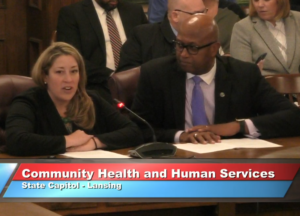Budget talks stuck; your voice needed to propel action
 October has come and gone, but Michigan leaders still have not resolved a budget impasse that imperils millions in county funding for key programs.
October has come and gone, but Michigan leaders still have not resolved a budget impasse that imperils millions in county funding for key programs.
While MAC is told that discussions between Gov. Gretchen Whitmer and legislative leaders are ongoing, no positive results have resulted.
It is vital, therefore, for every county leader who has not already done so to contact their state officials and urge immediate action on supplemental appropriations bills. Your voice is very powerful; MAC needs your support in order to incite movement toward restoring the funding that was slashed by the governor’s vetoes.
- You can call the governor’s office at 517-373-3400.
- Click here for the House of Representatives’ phone list.
- Click here for the Senate’s phone list.
Members also are encouraged to utilize our Advocacy Center to send pre-drafted messages to lawmakers with just a few clicks of your computer.
For more information, please contact Deena Bosworth at bosworth@micounties.org.
House panel takes up delinquent tax forgiveness
 A bill that would authorize a foreclosing governmental unit to forgive some or all unpaid delinquent property taxes, fees and interest for those meeting poverty eligibility guidelines or qualify for disabled veteran property tax exemption received its first hearing this week.
A bill that would authorize a foreclosing governmental unit to forgive some or all unpaid delinquent property taxes, fees and interest for those meeting poverty eligibility guidelines or qualify for disabled veteran property tax exemption received its first hearing this week.
The House Committee on Local Government and Municipal Finance took testimony on House Bill 5124, sponsored by Rep. Wendell Byrd (D-Wayne)., which was introduced to assist those communities faced with residents in poverty who are losing their homes because they cannot keep up with the taxes, interest, fees and penalties.
MAC has not yet taken a position on the bill, but is encouraged that the bill is permissible, not mandatory, on counties, which preserves local control and allows counties to tailor the program to what best suits their residents.
For more information on this issue, contact Deena Bosworth at bosworth@micounties.org.
County officials: Community corrections good, but could be better
 Leaders in community corrections programs around Michigan gave testimony this week to a House appropriations subcommittee on the state of such programs and ideas to improve them.
Leaders in community corrections programs around Michigan gave testimony this week to a House appropriations subcommittee on the state of such programs and ideas to improve them.
The subcommittee, chaired by Rep. Thomas Albert (R-Ionia), heard from Andrew Verheek of Kent County Office of Community Corrections (OCC); Mary McLaughlin of Saginaw County OCC; David Stevens of Thumb Area Regional OCC; and Ionia County’s Ron Morseau and Brent Denny.
All spoke to the benefits of community corrections programming, as well as how the system could be improved with state policy changes. Saginaw’s McLaughlin, for example, noted, “The Pretrial Supervision Program has grown to monitor more than 600 offenders per year with a 70 percent success rate in a community where violent crime was once rated nationally.”
Suggestions for the legislative action included more flexibility between funds for the felony drunken driver jail reduction program and community corrections plans and services funds, since the population typically overlaps. Ideas were shared to improve risk assessment data sharing between state and locals, along with goals to maximize the referrals to programs.
A Department of Corrections representative also spoke to some of the ways the system could be improved, while noting some county programs are recognized nationally for their successful programming.
For more information on this issue, contact Meghann Keit at keit@micounties.org.
Michigan adopts ‘Raise the Age’ legislation

Michigan will no longer automatically charge 17-year-old defendants as adults, following Gov. Gretchen Whitmer’s signature this week on so-called “Raise the Age” legislation.
MAC supported the final version of the package after modifications were made to ensure proper funding for additional juvenile justice services under county purview.
“I’m proud that Michigan has joined 46 other states in ending the unjust practice of charging and punishing our children as adults when they make mistakes,” Gov. Gretchen Whitmer said in a press release. “These bills will strengthen the integrity of our justice system by ensuring that children have access to due process that is more responsive to juveniles.”
Beginning Oct. 1, 2021, Michigan law will handle most 17-year-olds in the juvenile justice system. MAC had long expressed concerns to legislators about the financial and service implications of this shift. However, after much negotiation, changes to the bills addressed those concerns, allowing MAC to support the final versions.
For further information on the final bill package, see the Legislative Update from Oct. 18.
Kent County leaders urge rescue of foster care pilot
 Kent County leaders testified before a Senate subcommittee on behalf of a performance-based foster care program now at risk of closure due to the fiscal 2020 budget fights in Lansing.
Kent County leaders testified before a Senate subcommittee on behalf of a performance-based foster care program now at risk of closure due to the fiscal 2020 budget fights in Lansing.
Sen. Peter MacGregor (R-Kent), chair of the Community Health/Human Services Appropriations Subcommittee, took testimony regarding the West Michigan Partnership for Children (WMPC). MacGregor has been a champion for foster care and this enhanced program in Kent County throughout his time in the Legislature.
On Oct 1. 2017, responsibility for 800 Kent County children transferred under the new model for WMPC to administer with a front-loaded case rate that incentivizes getting children out of the foster care system sooner. This transition began the first year of a projected five-year pilot.
But with nearly $2 million transferred by Gov. Gretchen Whitmer through the State Administrative Board for FY20, the pilot program is in jeopardy of closing only two years into the five-year trial. WMPC CEO Kristyn Peck told the subcommittee about improved outcomes such as a decreased length of stay for foster children and more immediate permanency, plus the benefits of enhanced wrap-around foster care services.
Kent County Board Chair Mandy Bolter and Kent County Administrator Wayman Britt urged restoration of the funds as soon as possible. Bolter asked the committee to “work together to restore this funding because if not, we will have to shut the doors on Nov. 14.”
Britt explained how the pilot model “simplifies our child-care funding system to focus on results and not who pays.” He added, “This is an opportunity to create a quality system that focused on the kids and their time in care.”
Proponents see the pilot as the first step in improvements for foster care efforts around the state.
If funding is not restored, WMPC’s caseload would move to the Michigan Department of Health and Human Services (MDHHS). To help advocate for Kent County and WMPC, click here.
Survey finds wide variance in county recession prep
 Less than half of Michigan counties have taken preparatory steps in advance of the next recession, a new survey of local public officials found.
Less than half of Michigan counties have taken preparatory steps in advance of the next recession, a new survey of local public officials found.
In its new release, the Center for Local, State and Urban Policy (CLOSUP) at the University of Michigan found: “Although most of Michigan’s local governments report slow but steady improvement in fiscal health over the decade since the Great Recession, many local leaders express concerns about weathering the next recession, whenever it arrives.”
In county-only data provided by CLOSUP to MAC, 45 percent of respondents said preparatory steps had been taken, with big differences by county size. For larger counties, those with more than 30,000 residents, nearly 57 percent had reported actions, while the same was true for only 29 percent of smaller counties.
CLOSUP emphasized that this is a self-reported survey with a small sample size for counties.
To see all the CLOSUP data, click here.
State sends scrap tire grants to two dozen county entities
 About 25 counties and count entities will receive nearly $700,000 in state grants to support scrap tire collections and other tire cleanup efforts.
About 25 counties and count entities will receive nearly $700,000 in state grants to support scrap tire collections and other tire cleanup efforts.
The Michigan Department of Environment, Great Lakes, and Energy (EGLE) announced the grants this week to 72 such events, awarding $1,277,351; another five grant projects will fund the removal of old tire piles at private properties, the department said.
Counties and county entities receiving funds:
- Alcona, $4,000
- Superior Watershed Partnership, $70,000
- SW Michigan Solid Waste Consortium, $94,000
- NE Michigan Council of Governments, $6,255
- Bay County Mosquito Control, $8,000
- Benzie County Solid Waste Dept., $8,032
- Charlevoix, $11,444
- Crawford, $6,108
- Emmet County Dept. of Public Works, $14,550
- Genesee County Metropolitan Planning Commission, $10,000
- Grand Traverse County Resource Recovery Dept., $8,000
- Kalkaska County Recycling Center, $4,000
- Leelanau, $4,216
- Lenawee, $6,000
- Livingston, $10,000
- Manistee, $12,000
- Marquette County Solid Waste Mgt. Authority, $65,000
- Mecosta, $200,000
- Midland County Mosquito Control, $4,000
- Monroe County, $20,000
- Muskegon County, $56,376
- Newaygo County Board of Public Works, $8,152
- Ottawa, $14,500
- Saginaw County Mosquito Abatement Commission, $10,000
- Sanilac, $4,000
- Schoolcraft, $2,000
- St. Joseph, $4,000
- Tuscola County Recycling, $22,000
- Washtenaw County Public Works, $8,000
For more information, call the EGLE’s Environmental Assistance Center at 800-662-9278, or visit Michigan’s Scrap Tire Program at Michigan.gov/ScrapTires. To stay up to date on other EGLE news follow us at Michigan.gov/MiEnvironment.
State sets Nov. 12 webinar on shoreline erosion issues
 County leaders are encouraged to participate in a Nov. 12 webinar that will review shoreline erosion issues and work by the Department of Environment, Great Lakes and Energy (EGLE)
County leaders are encouraged to participate in a Nov. 12 webinar that will review shoreline erosion issues and work by the Department of Environment, Great Lakes and Energy (EGLE)
The webinar will run from 11 a.m. to noon. Click here to register.
“Due to higher water levels in the Great Lakes, Michigan’s shoreline communities and residents are experiencing an increase in shoreline erosion,” the department stated. “This webinar is an opportunity for local officials to learn more about EGLE’s response to Great Lakes shoreline erosion, the basic rules and processes for obtaining permits for shoreline protection projects, efforts EGLE is taking to expedite permits, and how you and your constituents can communicate and partner most effectively with us. The webinar will include a short presentation followed by time for questions from attendees.”
EGLE also has a new webpage dedicated to the topic, Michigan.gov/HighWater, with resources for local readers and residents.
For more information or assistance, send a note to EGLE-Assist@Michigan.gov.
Learn about ‘myths’ of tax incentives in Michigan
 A longtime analyst of Michigan’s economy will lead a webinar on Nov. 7 at 2 p.m. to address common myths about the value of tax incentives in economic development.
A longtime analyst of Michigan’s economy will lead a webinar on Nov. 7 at 2 p.m. to address common myths about the value of tax incentives in economic development.
In “Making Sense of Incentives: Taming Business Incentives to Promote Prosperity,” Timothy J. Bartik, a senior economist at the Upjohn Institute, will show how:
- Incentives don’t tip every location decisions of assisted businesses
- Once one accounts for the public service needs caused by job growth, typical incentives do not pay for themselves
- Incentives only have slight “fiscal benefits” (fiscal benefits are the increase in tax revenue minus the increase in needed public services’ spending)
To join the free webinar, go to http://ncrcrd.adobeconnect.com/ncrcrd1, “enter as a guest” is by default already chosen. Type your name into the text box provided and click on “Enter Room.” To facilitate Q&A’s, participants submit questions/comments via the Chat Function in Adobe Connect. See the event flier for more information.
The webinar will be recorded and archived at http://ncrcrd.msu.edu/ncrcrd/chronological_archive.

 A new survey effort from the Center for Local, State and Urban Policy — the Michigan Local Energy Survey (MiLES) — seeks county leaders’ responses on your county’s engagement (or not) with energy policies such as energy efficiency and reducing energy waste, renewable energy on county land, electric vehicle infrastructure and more. If someone from your county hasn’t already participated in the survey, please be on the lookout for an email with an online link or a hard copy in the mail.
A new survey effort from the Center for Local, State and Urban Policy — the Michigan Local Energy Survey (MiLES) — seeks county leaders’ responses on your county’s engagement (or not) with energy policies such as energy efficiency and reducing energy waste, renewable energy on county land, electric vehicle infrastructure and more. If someone from your county hasn’t already participated in the survey, please be on the lookout for an email with an online link or a hard copy in the mail.